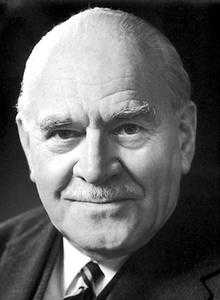Ronald George Wreyford Norrish
| Ronald George Wreyford Norrish | |
|---|---|
 | |
| Born |
9 November 1897 Cambridge, United Kingdom |
| Died |
7 June 1978 (aged 80) Cambridge, United Kingdom |
| Nationality | United Kingdom |
| Fields | Chemistry |
| Institutions | Cambridge University |
| Alma mater | Cambridge University |
| Doctoral advisor | Eric Keightley Rideal |
| Known for | Norrish reaction |
| Notable awards |
Davy Medal (1958) Nobel Prize in Chemistry (1967) Fellow of the Royal Society[1] |
Ronald George Wreyford Norrish FRS[1] (9 November 1897 – 7 June 1978) was a British chemist. He was born in Cambridge, England, and attended The Perse School and Emmanuel College, Cambridge.[2] He was a former student of Eric Rideal. Norrish was a prisoner for part of World War I (1914–1918) and later commented, with sadness, that many of his contemporaries and potential competitors at Cambridge had not survived the War.
Norrish rejoined Emmanuel College as a Research Fellow in 1925 and later became the Head of the Physical Chemistry Department at the University of Cambridge, occupying part of the Lensfield Road Building with the separate department 'Chemistry' (which encompassed organic, theoretical and inorganic chemistry). Both departments had separate administrative, technical and academic personnel until they merged to form one chemistry department under Sir John Meurig Thomas FRS in the early 1980s. Norrish researched photochemistry using continuous light sources (including after the 1945 war, searchlights). As a result of the development of flash photolysis, he was awarded the Nobel Prize in Chemistry in 1967 along with Manfred Eigen and George Porter for their study of extremely fast chemical reactions.[2] One of his accomplishments is the development of the Norrish reaction.
References
- ↑ 1.0 1.1 Dainton, F.; Thrush, B. A. (1981). "Ronald George Wreyford Norrish. 9 November 1897-7 June 1978". Biographical Memoirs of Fellows of the Royal Society 27: 379. doi:10.1098/rsbm.1981.0016. JSTOR 769878.
- ↑ 2.0 2.1 "Ronald George Wreyford Norrish (1897 – 1978)". Emmanuel College, Cambridge. Retrieved January 25, 2012.
External links
- Norrish's Nobel Foundation biography
- Norrish's Nobel Lecture Some Fast Reactions in Gases Studied by Flash Photolysis and Kinetic Spectroscopy
- List of publications from Microsoft Academic Search
|
